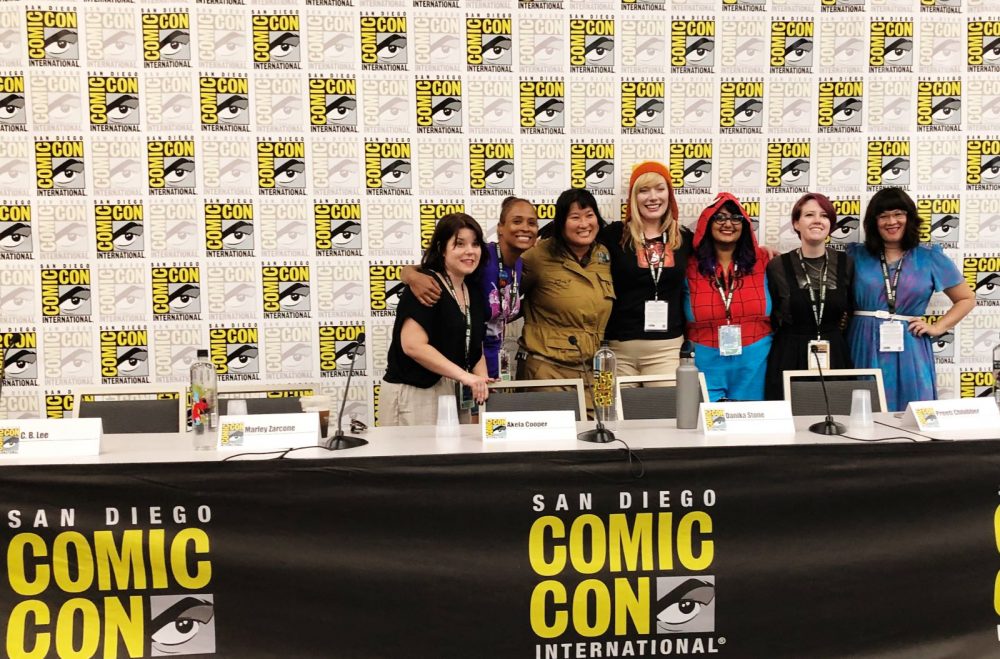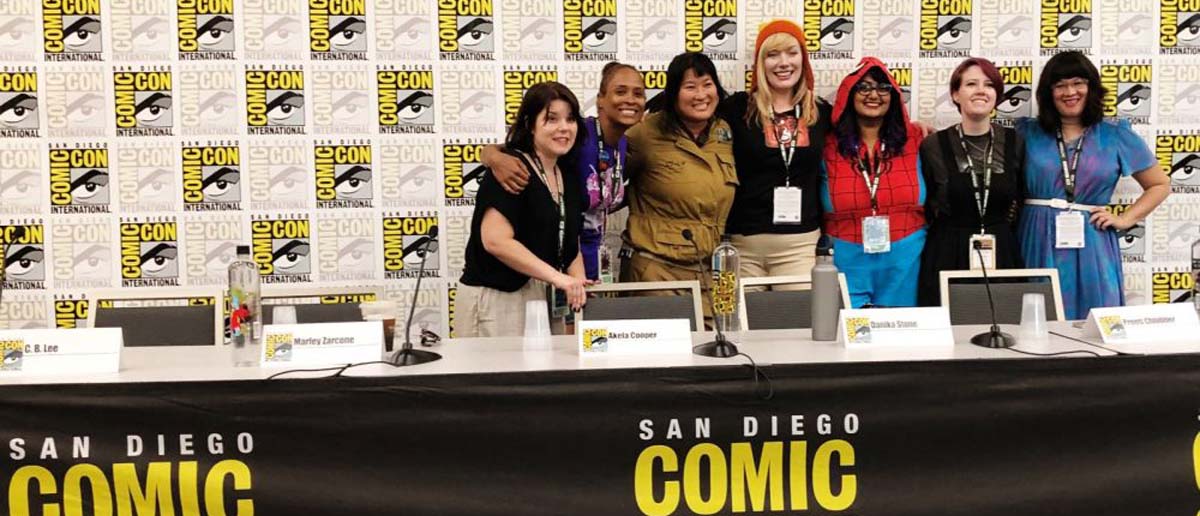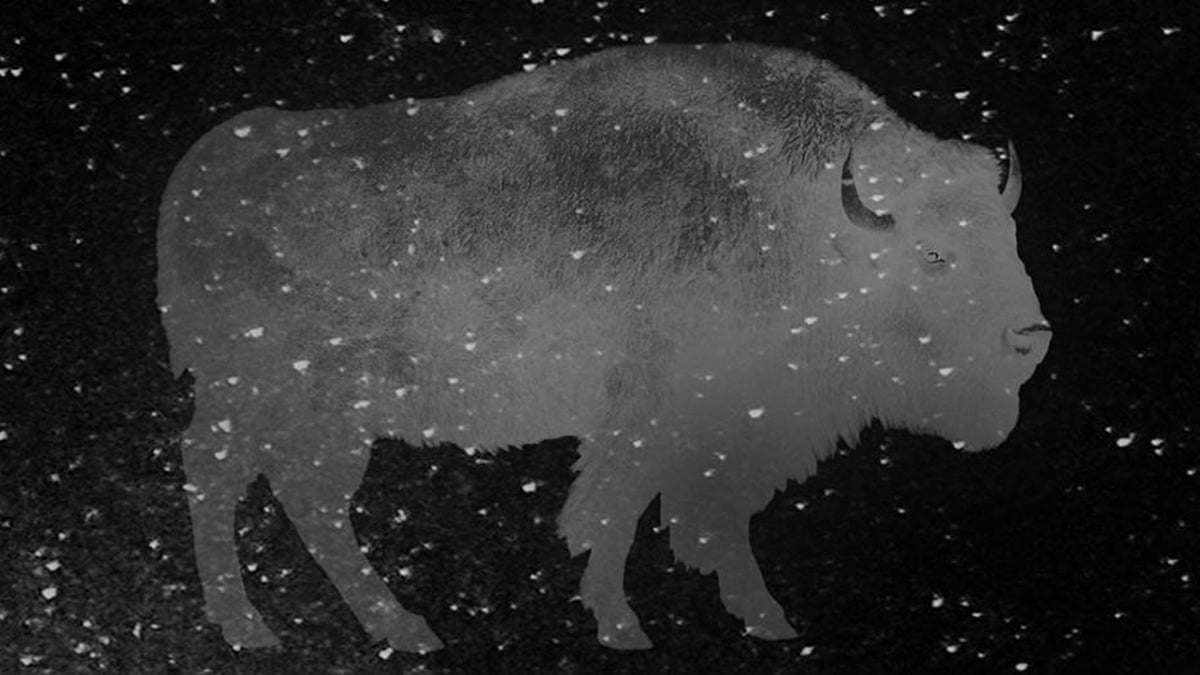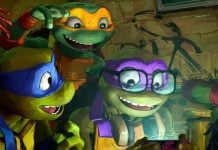“You don’t owe anybody an explanation.” — Preeti Chhibber
To put an end to the tired debate about who gets to be a fan and who doesn’t, C.B. Lee (Not Your Sidekick) put together a panel to discuss just why being a geek is for everyone. The panel consisted of a wide array of creators and writers including: Preeti Chhibber (A Thousand Beginnings and Endings), Akela Cooper (Luke Cage), Sarah Kuhn (Heroine Complex), Ashley Poston (Geekerella), Danika Stone (All the Feels), and Marley Zarcone (Shade the Changing Girl). The hour long panel took place on Saturday, July 21 at San Diego Comic Con.
The panel kicked off with a question from C.B. Lee, who was cosplaying as Rose Tico from Star Wars, about why they love being a geek and what it means to them to be a geek. Writer Sarah Kuhn says that being a geek is about having a passion for something that the outside world may not understand. The beauty of fandom is that it gives us a way to share that passion and form bonds, which can help us feel less alone.

C.B. Lee asked the panelists to reflect on how women are represented in geek culture, in particular, how women treat other women in fandom. Artist Marley Zarcone says that she’s seen the community change a lot over the past 15 years. Speaking about her early years Zarcone said, “There were always women in comics, but it didn’t feel like we were a part of comics, we were made to feel like we were intruding. Now it has evolved to where I feel comfortable with what I do.”
The panelists cited the rise of social media, specifically Twitter, in aiding them to reach other geek girls and like-minded communities. The fallacy of the fake geek girl, which is similar to the manic pixie dream girl, exists as a way to keep women and girls out of traditionally male spaces. Addressing the notion of the fake geek girl, Sarah Kuhn said, “I wrote my first novella as this kind of aggressive, mean geek girl because this is my reality. They aren’t really thinking about if they are beautiful and don’t know it, or turning into a supermodel when they take off their glasses.,. They want to get in there and talk about X-Men continuity. […]We actually don’t care that much about what guys think of us”
The writer and podcaster Preeti Chhibber talked about the two communities that exist, fans and another group of people who are just so angry that women are there. There is a desire by some fans to take and claim ownership over a particular fandom, these panelists reject that kind of toxic fandom. Instead of constantly trying to break into white-male communities, the panelists said they have received the most fulfillment by forming their own communities. That’s not to say, however, that they won’t push back against toxic fandom. Danica Stone talked about how important it is for marginalized folks in fandom to hold the line, “We have to not step back.”
Preston, a gamer, says the evolution of exclusivity within geekdom is slow but it is improving. Speaking in more broad terms, Preston said, “You don’t have to prove you are a fan. If you like something you are a fan.” Adding, “We all interact with media differently, we all absorb media differently.”
The panel talked about the desire to continue to create inclusive spaces and reject the old guard (aka white male geek spaces). By creating this new guard, filled with the voices of those who have been too long ignored by popular culture, we can all help drown out the old one. It’s an important moment for fandom and geek girls as our voices are becoming louder. The push back that is now happening is because the old guard is feeling the pressure: adapt and include, change or be left behind.
There’s a real need for stories that go beyond simply discussing the trials and troubles of marginalized folk. For Sarah Kuhn, that means writing work that centers around friendship, fun, humor and romance. Chhibber, who runs Desi Geek Girls, says that she really wanted to reach out to and make a space for women like her.
For the women on this panel, the work they create is to help address those vacancies they see in popular culture. That’s why Akela Cooper says it was important for her to be a part of a show where the black woman character was angry and had a reason to be angry. It’s about rejecting the notion that marginalized folks are monoliths, that they all like the same thing or react in the same way. It’s about showing the nuances of humanity and embracing them so that we can grow communities built on respect and openness.
Everyone deserves the chance to see themselves represented in popular culture. The message that the panelists wanted the audience to leave with? We’re all fans and there should never be a limit or prerequisite to fandom.









Speaking as a white male geek, when they say drown out the old space, I take it they mean the toxicity that’s been allowed to fester and not white male geeks in general? That always used to confuse and bother me.
Yes there is.
Instead of “rejecting” and “drowning out” the old guard (white male geeks), why can’t men and women SHARE the same spaces? Creating all-female spaces is no more progressive than the boys-club fandom of old.
George, first you have to organize a community for yourselves before fighting for inclusion elsewhere.
Torsten, I HATED the boys club that used to dominate fandom. And I don’t get along with the cranky old farts who want it to stay that way. When I was growing up, I would have been overjoyed to find “geek girls” to talk comics (and sci-fi, fantasy and horror) with. But I didn’t know any. This was, of course, pre-internet.
My experience was like that of Mark Waid, who also grew up in the South of the ’60s and ’70s. Waid wrote that he knew there were girls who read comics; he saw their names on the letters pages. “But if there were any in a 500-mile radius of me when I was an adolescent,” he wrote, “they were well hidden.”
(That’s from Waid’s introduction to the book “Chicks Dig Comics,” which I recommend.)
I have meet people I am very certain where professing a fandom in thing they knew very little about and did not really seem to like. But that almost always seems to have money or wanting to part of a click involved. For example a coworker of mine tried to pass herself off as a member of the horsey set to get in good with one of our clients. And I know I have played and talked golf ten times more then I have ever wanted.
So I do not know of anything magical about comic fandom that keeps it from happening with it. So there are Fake Geek Girl and Fake Geek Guys. However I see no reason to think that most guy and girl fans are not real.
There are lots of people on the internet who claim to be “film buffs” or “movie fans.” But when you chat with them, it becomes clear that they have little knowledge of, or interest in, any movies other than Star Wars, superheroes, and a few other popular franchises. Their idea of an “art film” is something from Tarantino or the Coen Brothers.
Comments are closed.